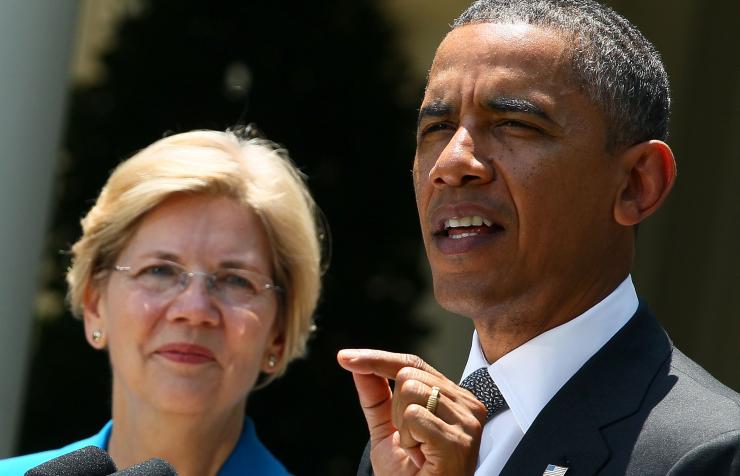
In a surprise move, Senate Democrats helped block a bill mainly supported by Republicans that would have given authority to President Barack Obama to ease trade deals through Congress. That decision could make it harder to win bipartisan approval for the landmark trade deal known as the Trans-Pacific Partnership, or TPP.
According to Siobhan Hughes and William Mauldin of the Wall Street Journal, Sen. Elizabeth Warren (D-Mass.) teamed up with Sen. Ron Wyden (D-Ore.) and other pro-trade Democrats to halt "fast-track" passage of the TPP on Tuesday. They argued that it would not adequately protect Americans "from unfair foreign practices like dumping cheap exports."
"We cannot rush through the largest trade deal ever while leaving American workers and manufacturers behind," Sen. Sherrod Brown, D-Ohio, said.
The Wall Street Journal reported that 60 votes were needed to begin debate on the measure. However, 42 Democrats and two independents voted against moving the bill forward in the process.
"This issue's not over," Senate Majority Leader Mitch McConnell, R-Ky., said. "I'm hopeful we'll put this in the win column for the country sometime soon."
According to the Wall Street Journal, McConnell voted "no" as part of a procedural measure that would allow him to push forward again on another vote to open up debate on the issue. An Obama administration official noted that the president met with a group of Senate Democrats to help move the bill with their approval.
"The president reiterated his view, which he has shared in numerous similar conversations with members over the past several weeks, that passing TPA is an important step toward finalizing the Trans-Pacific Partnership-the most progressive trade agreement in our history," the official said.
Support for the global trade bill has come mostly from Republicans, which is a rarity in the modern U.S. political landscape. Matthew Cooper of Newsweek reported that the TPP still needs support from Democrats due to the complex rules of passing a trade agreement.
"Unlike a regular diplomatic treaty, which requires two-thirds approval in the U.S. Senate, this kind of trade deal requires just majority approval, but in both chambers," Cooper wrote. "Before a vote on the agreement itself, Congress must respond to the president's request for so-called fast track authority."
Cooper noted that although Republicans have expressed rare agreement with Obama, some of them have their own concerns.
"Republicans are mostly for it, but many are concerned about what they see as ceding sovereignty," Cooper wrote. "Also, many more House Republicans now represent blue-collar districts that have been hurt by the exportation of American manufacturing jobs. Voters there are wary of international trade agreements like the TPP, and their GOP representatives may feel pressure at home to vote against it."
Cooper contended that Obama will need to rely on McConnell and House Speaker John Boehner to secure passage of TPP.
"Both men back the accord enthusiastically, which is one piece of good news for the president," Cooper wrote.
According to Paul Kane of the Washington Post, the legislative impasse has pitted Warren against Obama. The president wants to complete the TPP before he leaves the White House, but he is facing off against a senator "who became the ideological standard-bearer in the party's fight against big banks and corporate greed."
"She's wrong on this," Obama quipped, arguing that Warren was "a politician like everybody else."
Kane noted that Warren accused the president of not allowing the American people to "read the agreement" before voting in the Senate took place on it.
"The president is asking us to vote to grease the skids on a trade deal that has largely been negotiated but that is still held in secret," Warren said.
The Wall Street Journal elaborated on the various reasons why Democrats objected to the trade bill.
"Some Democrats oppose trade agreements like the Pacific deal outright," Hughes and Mauldin wrote. "Others are willing to support them but wanted strong protections for labor; and still others wanted to include provisions that would penalize countries that engage in currency manipulation."
According to the Washington Post, the TPP is a trade deal with 11 other Pacific Rim nations that would, if passed, affect roughly 40 percent of the global economy.














